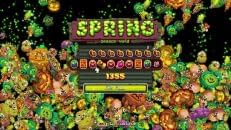Impressions From The ‘Indie Buskers Game Bundle’
Editor’s Note: Colin Brown returns once again with more bundle impressions, this time from the weekend-long game jam held by the Indie Buskers. This article was originally posted on Backlog Journey where Colin has a whole host of bundle reviews and similar posts to interest and entertain you.
So this weekend was the long awaited game jam of the Indie Buskers, a superstar team of underground indies who wanted your crazy ideas (shout out to the butt shotgun guy). The plan was that they would take these ideas and over just 48 hours turn them into real games that you can play and everything. Well, they’ve certainly put their best effort forward for each of the winning ideas, and you can play them all by dropping a few dollars into the Indie Busker hat on their website. Don’t try to slink by and say that you don’t have any change on you, because these buskers take credit. So ha.
Since it’s kind of like a bundle, I decided to treat it as such and do one of my beloved bundle reviews, mostly just to step in and explain a little bit about how each game turned out. Obviously the 48 hour limit means that the games aren’t going to be very lengthy and deep affairs, but there is a lot of good ideas and impressive designs that went into each of these titles.
Rose and Time
Developed by Sophie Houlden
Platforms: Windows, Mac, Web
I have to say, I think Rose and Time is probably my favourite game to come out of this jam. Like the other games from the Buskers, it doesn’t exactly feel complete which, yeah, that’s to be expected for a 48 hour game jam. And also like most of the games in the pack, Rose and Time could (and should) be blown up into a larger and longer experience, but as it stands you get a pretty excellent game from start to finish with a very entertaining central hook.
The idea of Rose and Time is that you are a girl named Rose who is after some Time Crystals. As Rose, you need to replay the level over and over because time travel. “Yawn! Games where you interact with your past self. I’ve been playing those since 2008.” Ah, but the catch is that because Rose didn’t see a future version of herself the first time you played the level, you have to make sure the past you doesn’t see present you, because that would violate what past you experienced when present you was past you and cause a wibbly wobbly time paradox. Think about that for a second, because it makes a lot more sense than my run on sentence implies.
So you get a stealth game, in which you need to plan your actions during the first go around so later on you will be able to avoid spotting yourself. Rose needs to sneak around corners and cover her eyes alongside the usual stuff like when to step on and off of the switches. It’s a bit of a genius idea and Sophie pulls it off with some great level design and excellent graphics using the versatile Unity engine, plus it’s all bookended by a cute story about Rose trying to save her family. It’s short (though more levels are forthcoming in a “day one DLC” update), and the line of sight for your past duplicates is a bit wonky, but I really loved it and I’d easily put up more money for a fully loaded release.
The Sun is Deadly
Developed by Rat King Entertainment
Platforms: Windows, Mac
The Sun is Deadly is another stealth game (hooray!) that focuses on the life of a vampire. You get to skulk around, leaping from the darkness to bite the necks of virgins. What’s not to like? Unfortunately for you, the sun is out which means you’ll be largely restricted to moving around in the shadows and alleys. Worse yet, there are plenty of bobbies ready to beat you into submission if they spot you running about. To add to this grave mythological inaccuracy—they don’t even have stakes!—your vampire also has psychic powers, able to slowly move around boxes and crates to create shadows and hiding spots. The eventual goal is to grab a shiny trinket hidden somewhere in the level and lure one of the dumb superficial virgins back to your grave.
This is a pretty early alpha game, so there’s a few problems. Virgins and cops eventually come back to life after being drained by you, but there is no indication you previously drained them and you can’t attack them again. Moving the trinket through telepathy is difficult and not great fun. The main issue is lack of levels—there are three—and lack of balance in the levels; level two, for instance, has a series of arches that seem literally impossible to get past without being noticed and losing half your health. However, Rat King is hard at work on tweaking the bugs and fixing some of the balance, so I’m excited to see how the final version plays out and I’d love to see more experimentation with the idea.
Even with the issues, the world looks great, the mechanics are solid and I seem to detect more than a passing Thief influence, always a good sign in my book. The Sun is Deadly even does stealth mechanics very well, which is a quite difficult achievement to pull off in a 48 hour game jam. Like with Rose and Time, I would absolutely love to see this game picked up and expanded into a full release, as great stealth games are hard to come by these days, and it’s even rarer to find one with a unique hook.
Super Office Stress
Developed by Sos Sosowski (you should seriously follow this link)
Platforms: Windows, Linux with some source edits
Much as I love the indie community, I can’t be everywhere at once. So I had not heard of Sos before the Buskers, but I was surprised to learn he was the one who made Thelemite, a really fantastic Flash game. His contribution to the Buskers is similarly flashy and gory, but aside from that almost completely different. Super Office Stress is a roguelike in an office building in which you beat the snot out of your coworkers. While you do this, you also have to replace your inferior fleshbag parts with bits and pieces of office furniture to upgrade your stats and increase the odds for your attempt to reach the Mythril Copier.
It’s not a pretty game, but I’m pretty certain that isn’t so much the intention. It’s also presented from a behind the shoulder third person perspective, and it entirely ditches the grid based system of most roguelikes. There’s actually a strong beat-em-up influence, as you can even pick up and chuck your gear at your enemies for a special attack. Of course, most of the time you’ll be just fine with the basic attack.
Which is kind of one of the game’s problems: there is very little depth to it besides holding attack and running into baddies. I know, 48 hours and all that, but out of all the games the Buskers created Super Office Stress strikes me as the one that would be the least interesting to blow up into a full game. And that’s ok, really. Sos strikes me as someone willing to experiment a lot, judging from his brilliant website, commitment to game jams like Ludum Dare and large range in style and scope of previous games. Not every game idea turns out brilliantly when turned into a full release, but it was fun to see a developer take a pretty straightforward idea—roguelike with all the names changed to office things—and turn it into an unexpected and delightfully weird experiment.
Pirate Space Program
Developed by Polygon Toys
Platforms: Windows, Mac
Pirate Space Program is a pretty short, limited experience, and you can basically be finished with it in about twenty minutes. However, it’s fun, it’s kind of hilarious and it’s right behind Rose and Time for my top pick for the game I wish would get expanded on. “A game about a pirate who wants to be an astronaut” reads the sage words of Chman, the user who submitted the idea. While that sounds like the recipe for yet another launcher game, Pekuja takes it in a different direction
At first, the game comes across as an homage to Sid Meier’s Pirates, one of my all time favourite games. You sail around an island riddled ocean searching for plunder. When you approach a target, you can control your two cannons individually to charge up attacks, sink the ships and collect the coins they drop. Admittedly it’s a rather one sided affair as the ships don’t fire back, but they do try to evade you; it’s not a complete cakewalk as the targeting system is a bit tricky to aim, but in a good way.
The point of collecting these coins is to buy upgrades for your ship (they can drop randomly from other ships as well). Instead of boring stuff like better sails and swillier grog, the upgrades are awesome things like lasers and jump jets. Eventually, after you find all four upgrades, your pirate space ship will be an unstoppable monster and you’ll be able to leave your earthly confines. It doesn’t take long to achieve, but there is something hilarious and awesome about throwing retractable wings onto a pirate ship and raining death from above. Like I said, I’d love to see this blown up into a full title along the lines of Sid Meier’s Pirates but with Spaceship Parts; throw in towns to trade at, or just raid, plunder and bomb, and perhaps have rival ships that will attack back. With a bit of extra work I feel like this could turn from a brilliant tech demo to a seriously amazing title.
Pakkuman Defense
Developed by Tametick
Platforms: Windows, Mac, Linux, Web
Did you know that the original name for Pac-Man was supposed to be Puck-Man after the Japanese phrase “paku-paku”, which means to flap one’s mouth open and closed? Did you also know that the game is about one hundred times better with tower defence in it? Pakkuman Defense is one of those awesome retro mash-ups I love to see, but beyond the charm, kitsch and satisfaction of blowing up those hateful ghosts, the simple addition to the age old Pac-Man formula actually gives the game a ton of strategic depth.
The premise is simple: play Pac-Man but use the dots as currency to build ghost destroying towers. Yet somehow this simple twist makes the game so very different. Since there are a limited number of dots, you can build a limited number of towers, so it’s important to establish safe zones and figure out the most efficient tower placement to keep the endless spawning of ghosts in check. The randomized map design is far more brutal than the original, with dead ends and lots of choke-points to get cornered in, so tower placement doubles as a way to get out of a jam. The other big twist is that dots carry over between levels, so overspending to make one level easy could lead to disaster later.
The two criticisms I have for Pakkuman Defense are the lack of multiple lives (even the real Pac-Man wasn’t so cruel) and the slight issues with finicky controls that sometimes refuse to turn or stop. But while these problems contribute to the intense difficulty, they certainly aren’t a dealbreaker. Out of all the games in the Busker collection, this is the one that seems to be the closest to a full and ready to roll out game, and aside from those few minor complaints I don’t think there’s many ways you could improve the simplicity that perfectly captures the feel of Pac-Man’s arcade roots. Pakkuman Defense is a whole new way to approach the Pac-Man model, and one that succeeds in almost every way.
—
It’s not entirely clear how long the Buskers will be letting latecomers throw in a few dollars, so if you’re interested you really shouldn’t delay. There’s a lot of great talent and ideas on display here, so if you find game design fascinating or you just like to support neat ideas from indies, hop over to their site and throw a few bucks in their hat.
If you dig the posts, remember to give me a shout on Twitter, Facebook or Google Plus. I always appreciate the feedback, and love to hear about what people would like to see me cover.






